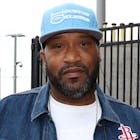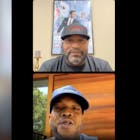“And I’d always been a big kid all my life. But he took pride in it and he was very clean and very well-dressed. Heavy D was considered a ladies man, and I'm like, ‘OK, so you can be a fat dude, you can rap, you can still be cool and you can still get girls?’ I’m like, ‘OK, I’m here, let's do this.’”
And he did. Born in Houston, Bun B (real name Bernard Freeman) moved to Port Arthur with his mother when his parents divorced. After meeting Chad Butler — better known as Pimp C — they formed the Southern Hip-Hop duo Underground Kingz (UGK) and produced five albums together, including the Billboard hit Underground Kingz.
Tragedy struck in 2007 when Pimp C was discovered unresponsive in a Los Angeles hotel room, just four months after the album was released. The duo’s final album, UGK 4 Life, was released posthumously in 2011.
That same year, Bun B was confronted with another tough loss. Heavy D, the man he’d idolized as a kid, collapsed outside of his home in Beverly Hills and was rushed to Cedars-Sinai Hospital where he died. The official cause of death was a pulmonary embolism, which doctors surmised originated from a blood clot formed in his leg while traveling on a plane.
“I literally got an email from him about a month before he passed,” Bun B remembers. “He had sent me some music because he was also a producer, and he wanted to collaborate. But he passed away before we could even do anything.”
Naturally, Bun B has become close to many of his musical heroes over the past two decades, but it wasn’t necessarily anything he expected.
"A lot of the people that I looked up to and idolized ended up going from being just people in magazines and on television to actually being my peers,” he says. “I wouldn't dare call them my contemporaries obviously, but we were moving in the same circles. Different artists that I'd looked up to, I met them and there was a mutual respect for each other. And so yeah, finally meeting people like him and Big Daddy Kane in person, and having them be like, ‘Oh yeah man, I know who you are. Dude, you can really rap’—for me, that was the real validation.”
Although Bun acknowledges record sales, fans, and money are also validating, nothing mattered as much as getting respect from an MC he aspired to be.
“You just want to be taken seriously and looked at seriously from the people that you looked up to,” he adds. “And so meeting Heavy and having Heavy know who I was, and not only being a fan but having that mutual respect and actually wanting to collaborate with music and, ‘Yo, give me your email’ and stuff—it was almost off-putting because you meet your heroes and you don't expect that.”







